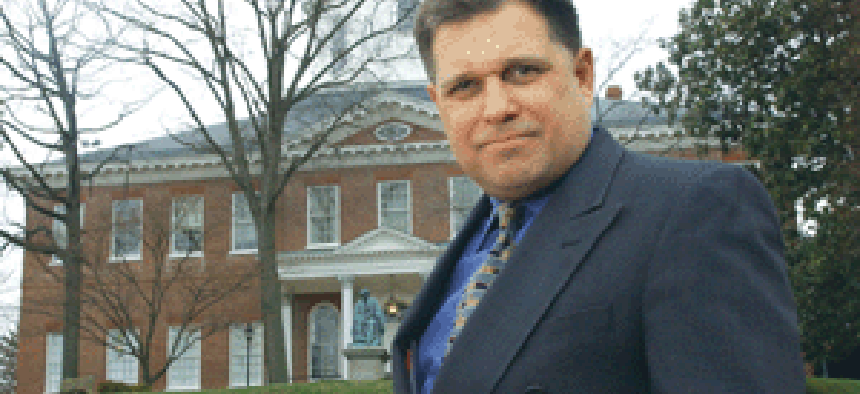Survival Guide: Perspectives from the field

As director of Maryland's Office of Homeland Security, it's Dennis Schrader's job to ensure that the state is doing whatever it can to minimize risks, prevent attacks and be prepared to respond against terrorism throughout the state's 12,400 square miles.
What are some of the greatest challenges you are facing in homeland security in Maryland, now that more than three years have passed since 9/11? We face some fairly consistent challenges. We're steadily building capacity in information sharing for law enforcement, emergency response communications, critical infrastructure protection and medical preparedness. There is a continuum. What has changed in the time since you begun this work? Are people still as driven to move quickly on homeland security as they were immediately after the attacks of 9/11? For us, the urgency is still there. It's pretty steadily trying to build security into our daily functions and processes. In November 2003, you created the Maryland Coordination and Analysis Center, which is one of the first so-called "fusion centers" involving federal, state and local personnel collecting data and analyzing data together. It includes law enforcement, the National Guard, emergency management, public health, emergency medical services and fire service personnel working side by side. How is that going? I hate that word, fusion center, because that doesn't tell you what it is. It's an information-sharing center. We have access to the terrorist watch lists there. It's working out great.We had a situation where we found a guy on the Bay Bridge last June who was out there filming the bridge. We forwarded the information to the center, and found out he was on the terrorist watch list. He was wanted in Chicago as a material witness. That was a success.You never know what you are disrupting. The success of the center is that we're able to communicate very effectively. The 9/11 Commission and other national reports have said that the inability of emergency responders such as fire and police agencies to communicate with each other across agency and jurisdictional lines is one of the chief challenges of homeland security. What is Maryland doing about this problem? The key issues are that you need governance, coordinated planning, investment and focus. The governor appointed the Public Safety Communication Interoperability Governance Work Group, which has just completed an engineering study for interoperability throughout the state for voice and date access to public institutions. Many state homeland security directors are from law enforcement or emergency management. You are neither. How has that affected your approach? I have a medical background, and our medical folks are very happy about that. About a third of the $322 million in federal reimbursement for security coming in to the state each year is for medical preparedness and security. What are the medical issues you're dealing with? We're rebuilding the public health system. There are many emerging infectious diseases and you have to be prepared. Bioterror is just an emerging infectious disease with criminal intent. Our biggest concern is a pandemic flu.What is the right attitude for a homeland security director's job? We have to be vigilant and we have to do our due diligence. We have to stay focused.The hardest part is that we're breaking new ground. There's a certain amount of blocking and tackling in this job as we are building operational capabilities.We're staying focused and staying strong. We don't want to create a new bureaucracy, we want to be lean and mean.
 As director of Maryland's Office of Homeland Security, it's Dennis Schrader's job to ensure that the state is doing whatever it can to minimize risks, prevent attacks and be prepared to respond against terrorism throughout the state's 12,400 square miles.
As director of Maryland's Office of Homeland Security, it's Dennis Schrader's job to ensure that the state is doing whatever it can to minimize risks, prevent attacks and be prepared to respond against terrorism throughout the state's 12,400 square miles.
It's a small state, but that's still a tall order.
Maryland is home to some of the federal government's largest and most sensitive facilities, including the top-secret National Security Agency and National Geospatial-Intelligence Agency; the huge National Institutes of Health, which has numerous health and bioterror research facilities; and the upcoming top-security National Biodefense Analysis and Countermeasures Center at Fort Detrick.
Maryland also has two large population centers as well as major highways, ports, bridges, tunnels, rail lines, power plants and universities.
The state's vulnerabilities have cast Schrader -- a former Navy captain, medical school administrator and Howard County councilman who is married to Republican State Sen. Sandra B. Schrader -- into a high-profile role. He reports directly to Gov. Robert L. Ehrlich Jr. and is the state's liaison to the U.S. Homeland Security Department.
He spoke with Staff Writer Alice Lipowicz about this role and the challenges facing his state.
WT:
Schrader:
WT:
Schrader:
WT:
Schrader:
WT:
Schrader:
WT:
Schrader:
WT:
Schrader:
WT:
Schrader:

Dennis Schrader, Maryland's Homeland Security director.
Rick Steele
It's a small state, but that's still a tall order.
Maryland is home to some of the federal government's largest and most sensitive facilities, including the top-secret National Security Agency and National Geospatial-Intelligence Agency; the huge National Institutes of Health, which has numerous health and bioterror research facilities; and the upcoming top-security National Biodefense Analysis and Countermeasures Center at Fort Detrick.
Maryland also has two large population centers as well as major highways, ports, bridges, tunnels, rail lines, power plants and universities.
The state's vulnerabilities have cast Schrader -- a former Navy captain, medical school administrator and Howard County councilman who is married to Republican State Sen. Sandra B. Schrader -- into a high-profile role. He reports directly to Gov. Robert L. Ehrlich Jr. and is the state's liaison to the U.S. Homeland Security Department.
He spoke with Staff Writer Alice Lipowicz about this role and the challenges facing his state.
WT:
Schrader:
WT:
Schrader:
WT:
Schrader:
WT:
Schrader:
WT:
Schrader:
WT:
Schrader:
WT:
Schrader:

